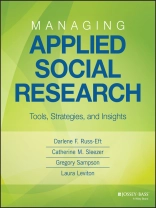Essential management guidance for real-world applied research projects
Managing Applied Social Research equips you with the skills, strategies, and knowledge you need to effectively manage research projects. Written by a team of nationally-known researchers, this book covers the systematic management of applied social research studies from ‘soup to nuts, ‘ providing researchers with an easy-to-follow process and the tools and templates for improving the quality, ethical conduct, and usefulness of the final products. The authors merge expertise adapted from the field of project management with their decades of experience in using established research methodologies and practices to offer readers; practical examples and insights gleaned from major research houses such as Rand, Urban Institute, Mathematica, American Institutes for Research, and others. Key concepts and methodologies are systematically unpacked, with detailed discussion of both theoretical bases and practical applications in the field. Written in plain English, the case studies and vignettes illustrate typical approaches to different scenarios, and the checklists, templates, and other tools provide guides for action.
Starting from basic social research strategies, you’ll build an understanding of applied research issues and how projects are best managed in a messy, imperfect world. From conceptualization and proposal through implementation, analysis, and reporting, this book helps you lead your projects to success.
* Learn the skills and concepts necessary to effectively manage applied research projects for the social science disciplines
* Anticipate and prepare for common challenges and obstacles
* Understand the various roles and their requisite tasks and responsibilities
* Learn strategies for making effective decisions about a study’s scope, work, schedule, people, budget, and risks during each phase of the research study
Social science research is an essential well of information upon which society is run. Proper management is the key to any research project’s success, and success becomes more critical in the field given the potential ramifications in terms of policy and its effects on real, everyday people. Managing Applied Social Research provides sound guidance and expert insight with an essential real-world focus.
สารบัญ
List of Tables and Figures
About the Authors
Foreword
Preface
Acknowledgments
Introduction
Section I: Overview
Chapter 1: Why Manage Applied Social Research Studies?
Chapter 2: A Bird’s-Eye View of Project Management
Section II: Planning the Study: ‘Deciding How to Conduct the Research Study’
Chapter 3: Plan the Scope of the Research Study
Chapter 4: Plan the Data Collection and the Data Analysis
Chapter 5: Plan the Study’s Work and the Research Schedule
Chapter 6: Plan the People
Chapter 7: Plan the Budget
Chapter 8: Plan How to Deal With the Risks
Section III: Executing the Study: ‘Delivering the Goods’
Chapter 9: Manage and Direct the Work
Chapter 10: Sustain the Team
Chapter 11: Consider the Worldviews
Chapter 12: Draft the Final Report
Section IV: Closing Out the Study: ‘Bringing It Home’
Chapter 13: Complete the Activities That End the Study
Chapter 14: Close Out the Study
Postscript: Renewing the Case for Research Management
Book References and Resources
Appendix A: List of Research Design and Management Tasks
Appendix B: Data-Sharing Agreement Example
Index
เกี่ยวกับผู้แต่ง
DARLENE F. RUSS-EFT, PHD, is Professor and Discipline Liaison of Adult Education and Higher Education in the College of Education at Oregon State University.
CATHERINE M. SLEEZER, PHD, works with Employee Training and Performance Improvement Specialists to consult on human resources.
GREGORY SAMPSON, PHD, is an educational researcher with a wide variety of professional experiences. He has worked on the design and execution of numerous high-stakes grants and contracts, as well as taught at several universities.
LAURA LEVITON, PHD, is Senior Advisor for Evaluation at the Robert Wood Johnson Foundation in Princeton, New Jersey.












